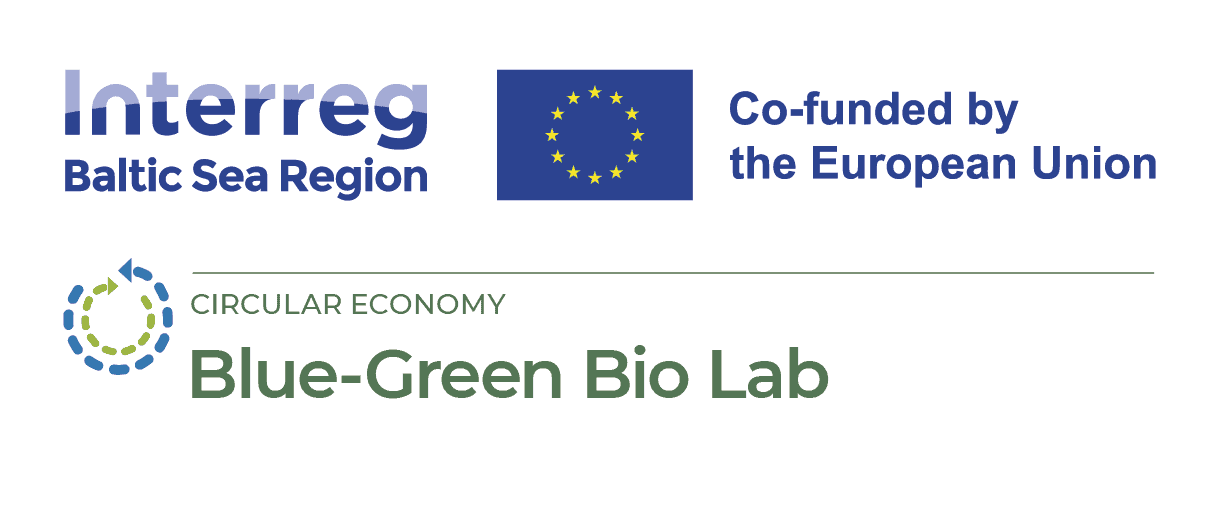
Blue-Green Bio Lab
Blue-Green Bio Lab
The story behind the Blue Green Bio Lab project starts with the urgent need in the Baltic Sea Region (BSR) to promote regenerative approaches in agriculture, end nutrient leaching to the Baltic Sea and inland waters and reduce nutrient loads to the marine environment. These urgent and multi-sector needs coincide with the focus of many countries in the region to develop greater self-sufficiency for goods such as food and energy.
The Blue Green Bio Lab partners see opportunities for addressing urgent environmental and climate needs and improving self-sufficiency through development of new circular bio-industrial symbioses based on blue and green biomasses.
As such the project contributes to the aims of the HELCOM Baltic Sea Regional Strategy for Nutrient Recycling with respect to closing nutrient cycles, reducing greenhouse gas emissions, improving soil quality and enhancing carbon sequestration. Furthermore, the biomasses at focus in the project support the EU Circular Economy Action Plan’s aims for making circularity work for people, regions and cities and making sustainable products the norm in the EU.
On land current cropping systems in the region are characterized by excessive use of nutrients and pesticides that deteriorate soil quality and biodiversity. In our seas and inland waters marine ecosystems are also under pressure due to among other things high nutrient loads and eutrophication. In the future, agricultural and aquatic production must be based on biomasses that produce positive ecosystem services such as carbon storage, nutrient recycling, prevention of erosion, sediment retention, etc. At the same time, agriculture and aquaculture need to secure a national self-supply with food/feed/biomaterials and carbon-containing biofuels.
This important sustainable transition of agricultural and aquatic production requires stakeholders across multiple sectors to collaborate in accelerating the development of circular bio-industrial symbioses. With circular bio-industrial symbiosis one company's residuals (previously referred to as waste products) serve as input for another company's production. Right now, the cross-sectoral capacity for developing industrial symbioses is lacking within the BSR.
The project aims therefore to accelerate the development of circular bio-industrial symbiosis by developing a toolkit for how to plan and proceed in these complex processes. As experience has shown local authorities to be crucial to industrial symbiosis development, they are the primary target group for the project.
The project is a transnational cooperation between partners in Denmark, Sweden and Latvia interested in developing circular bio-industrial symbiosis around blue and green biomasses. During the project the partners cooperate on the following activities:
1. Analysis of biomasses with symbiosis potential and positive ecosystem services. These analyses are currently available in the form of 5 climate and environmental policy briefs on the project website.
2. Local workshops using a transnational design for initiating discussions around circular bio-industrial symbiosis using the Art of Participatory Leadership methodology. National and transnational learning from the workshops will be presented in a series of bio-industrial symbiosis briefs.
3. Discussions between partners, experts and policy-level actors regarding ideas gathered from stakeholder workshops about barriers, regulatory and otherwise, to circular bio-industrial symbiosis. The partners aim to identify solutions and next steps shared via a series of policy briefs.
4. The partners collaborate to create the Blue Green Bio Lab Toolkit for developing circular bio-industrial symbioses across the Baltic Sea Region. The toolkit will contain briefs developed in the project and a step-by-step guide for starting discussions and tackling barriers to circular bio-industrial symbiosis development. The toolkit will be shared with public authorities and others to support these actors in addressing the complex challenges of facilitating the first steps on the road to circular bio-industrial symbiosis.
5. A final project conference will be arranged as a webinar on the 5.th of March 2024
This project has been made possible thanks to the support of Interreg Baltic Sea Region. The partners’ primary goal is that municipalities and other interested actors can use the knowledge developed in the project to start meaningful conversations and collaborations on circular bio-industrial symbiosis based on blue and green biomasses.
Budgets
in numbers.
-
0.50MillionTotal
-
0.40MillionErdf
-
0.00MillionNorway
Our solutions
-
Output
-
Output
-
Output
Blue-Green Bio Lab
in numbers.
- 56.5660559.030795
- 58.396572611.4196339
- 56.6455118.977909
- 56.651631223.724323912202415
- 56.98891924.0827495
- 58.396572611.4196339
Project partners
- TownSkive
- Region
- CountryDenmark
- RegionØstjylland
- RepresentativeSkive Municipality
- Phone
- E-Mail
- Web
- TownLysekil
- Region
- CountrySweden
- RegionVästra Götalands län
- RepresentativeLysekil Municipality
- Phone
- E-Mail
- Web
- TownSpøttrup
- Region
- CountryDenmark
- RegionØstjylland
- RepresentativeClimate Foundation Skive
- Phone
- E-Mail
- Web
- TownJelgava
- Region
- CountryLatvia
- RegionZemgale
- RepresentativeZemgale Planning Region
- Phone
- E-Mail
- Web
- TownRiga
- Region
- CountryLatvia
- RegionRīga
- RepresentativeLatvian Institute of Aquatic Ecology, Agency of Daugavpils University
- Phone
- E-Mail
- Web
- TownLysekil
- Region
- CountrySweden
- RegionVästra Götalands län
- RepresentativeLEVA in Lysekil
- Phone
- E-Mail
- Web
Contacts
-
Project manager, Financial manager, Communication managerCathy Brown StummanSkive Municipality
Follow us
-
Social media
-
Additional links
News
Events
| 05 |
| March |
09:00 - 11:30 (CET)
| 29 | - | 01 |
| November | - | December |




